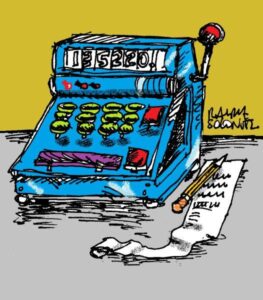MY RELATIONSHIP WITH THE IRS
My latest essay in the Cleveland Plain Dealer . . .
CLEVELAND HEIGHTS, Ohio — I want to be more than just another number with the folks at the Internal Revenue Service. I write “landlord/bandleader” in the “occupation” blank on my taxes. Maybe the word “bandleader” piques somebody’s interest at the Cincinnati IRS processing center. Maybe “bandleader” conjures up Benny Goodman or Jon Batiste and makes an IRS worker’s day more interesting. Or maybe nobody looks at my returns in Cincinnati.
In the 1980s, I had an in-person audit. I went to the downtown Cleveland federal building solo, without a lawyer or accountant. I knew about taxes. My father had taught me. He didn’t teach me how to fix cars, but he did teach me how to fix taxes. My dad used to keep two sets of books — one in pencil and one in pen. He gave the government the pen version (with creative math), and he kept the pencil version (with the real numbers). My dad had grown up on Kinsman Road during the Depression and was a self-made man.
The auditor didn’t find anything wrong with my taxes. That’s how the second generation often rolls: legit numbers. The auditor gave me an $80 credit for some “supplies” I had forgotten to claim.
I think about taxes. Not just in April. Taxes are interesting.
Here are some tax pointers for this season:
Schedule C/Business income: The government looks closely at sole proprietors’ expenses. As a bandleader, how should I list the candy bars I buy for my sleep-deprived, van-driving keyboard player? For instance, are his Milky Ways a “meal”? Or are they just “maintenance”? What if my drummer wears a bright-red suit on stage? Can he deduct the suit — and the dry-cleaning costs — as a business expense? Yes. But if he wears the suit offstage, as well — in real life — then, no deduction. It’s just a suit.
Qualified Dividends: Every year, I try to remember what qualified dividends qualify for. (They qualify for lower capital-gains tax rates.)

Schedule D/Capital gains and losses: In 1977, my wife-to-be, Alice, bought a couple shares of a Vanguard mutual fund. Did anyone other than Alice and Vanguard’s founder, John Bogle, own mutual funds in 1977? A smart business move — me marrying Alice.
Supplemental income and loss: Income from royalties and rental property are reported on the same Schedule E form. Why are such different sources of income on the same form? Are there many more “landlord/bandleaders” out there than I know about? I know an accordion player from Parma who owns a shopping-strip center on the West Side. I don’t know any other musicians collecting rent on the side. The most my band ever received in royalties was $45.56. That’s why I own rental property.
Depreciation/Form 4562: Buildings have different life expectancies than, say, people. Apartment buildings fully depreciate in 27½ years. Commercial buildings (like shopping strips) last 39 years. You don’t need to know that, unless you’re me.
Self-employment tax/Schedule SE: The tax on Social Security and Medicare is effectively 15.3% for a self-employed person. A salaried person pays only half that — 7.65%. That’s worth pondering about, if you’re a self-employed, small-business owner.
Maybe I’ll make somebody’s day in Cincinnati this month. I try to make my tax returns interesting. Just not too interesting.
—
(Illustration by Ralph Solonitz)

0 comments
Kick things off by filling out the form below.
Leave a Comment